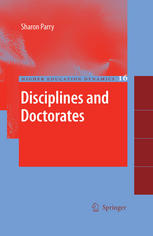

Most ebook files are in PDF format, so you can easily read them using various software such as Foxit Reader or directly on the Google Chrome browser.
Some ebook files are released by publishers in other formats such as .awz, .mobi, .epub, .fb2, etc. You may need to install specific software to read these formats on mobile/PC, such as Calibre.
Please read the tutorial at this link: https://ebookbell.com/faq
We offer FREE conversion to the popular formats you request; however, this may take some time. Therefore, right after payment, please email us, and we will try to provide the service as quickly as possible.
For some exceptional file formats or broken links (if any), please refrain from opening any disputes. Instead, email us first, and we will try to assist within a maximum of 6 hours.
EbookBell Team

0.0
0 reviewsAdvice about how to achieve a PhD usually falls short of relevance because the ways of creating and reporting knowledge differ dramatically from one disciplinary field and specialisation to another. Yet supervisors and doctoral candidates alike know that there are certain protocols or parameters, often inexplicit in nature, that govern its achievement and that need to be mastered. This book sets out to explore the nature of these protocols and parameters, linking them to the cognate characteristics of fields of knowledge and to social conventions constraining how new knowledge is reported.
‘Disciplines and Doctorates’ provides a detailed analysis of the experience of learning to make new knowledge at the level of the research doctorate. It does so from the perspectives of both supervisors and candidates across a range of disciplines in different university settings. It draws principally upon a very large-scale, empirical investigation at a number of Australian universities. It also provides a comparative account of doctoral study in different national systems.